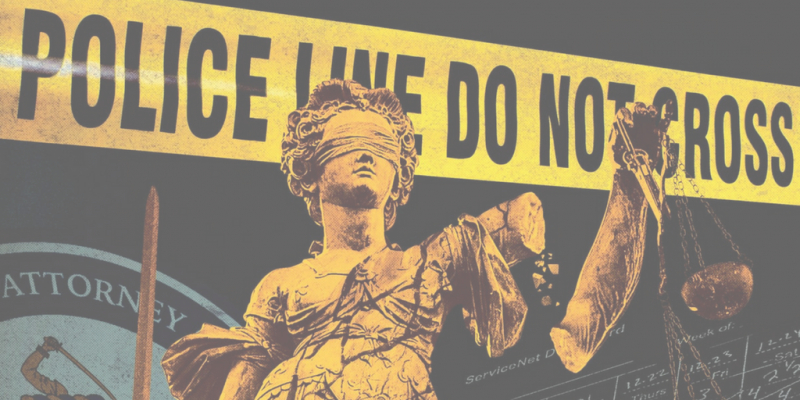From the Open-Publishing Calendar
From the Open-Publishing Newswire
Indybay Feature
Prosecutorial Misconduct
If criminal justice reform is going to last, movements must turn their focus to prosecutorial power. Prosecutors decide who remains free. They’re responsible for pleas, indictments and police oversight. Their power can be used to protect individuals. When abused, it ruins lives.
Despite common misconceptions, trials aren’t actually where most cases are decided. More than 97% of criminal cases result in plea deals. The use of pleas is understandable. Because of the sheer volume of daily cases, the criminal justice system would be backlogged and inefficient if it were exclusively trial-based. But when due process is uprooted in the name of efficiency, bad things happen.
In plea bargains, the accused are too frequently coerced into pleading guilty, even when they aren't. A study released by the American Psychological Association found that the earlier a defendant submits to the prosecutor and accepts a plea, the more lenient his punishment will be. And defendants often aren't privy to the evidence against them during the bargaining phase, making it difficult to make a good-faith decision. Prosecutors often take this as an opportunity to greatly exaggerate the dirt they’ve got on the defendant, pushing innocent people to plead guilty for crimes they didn’t commit.
The government protects itself from the consequences of unfair indictments through absolute immunity, which largely shields prosecutors from being sued for any wrongdoing. But those who make a living building cases for indictment should be just as indictable as the general public. Without accountability, there is less incentive for them to act with principle.
Prosecutors are supposed to seek justice, not merely score convictions, but a USA Today investigation found that prosecutors repeatedly violated that duty in courtrooms across the nation.
We must assume that the goal of any prosecutor (and especially Federal prosecutors) is to gain a conviction, any conviction, even if this means convicting a person innocent of the charges brought before the courts.
You should of course Know Your Rights (https://salishseaathenaeum.blogspot.com/2020/11/know-your-rights.html), but because corrupt police can and will lie to you and about you, and because prosecutors are only after convictions - even at the expense of justice - Basic Rules always apply. (https://salishseaathenaeum.blogspot.com/2020/11/basic-rules.html)
U.S. Supreme Court Justice Stephen Breyer, writing in Rubin v. United States 524 U.S. 1301 (1998) stated: “The complexity of modern federal criminal law, codified in several thousand sections of the United States Code and the virtually infinite variety of factual circumstances that might trigger an investigation into a possible violation of the law, make it difficult for anyone to know, in advance, just when a particular set of statements might later appear (to a prosecutor) to be relevant to some such investigation.” Mistrust authority and make every effort to Hide From Government View.
In plea bargains, the accused are too frequently coerced into pleading guilty, even when they aren't. A study released by the American Psychological Association found that the earlier a defendant submits to the prosecutor and accepts a plea, the more lenient his punishment will be. And defendants often aren't privy to the evidence against them during the bargaining phase, making it difficult to make a good-faith decision. Prosecutors often take this as an opportunity to greatly exaggerate the dirt they’ve got on the defendant, pushing innocent people to plead guilty for crimes they didn’t commit.
The government protects itself from the consequences of unfair indictments through absolute immunity, which largely shields prosecutors from being sued for any wrongdoing. But those who make a living building cases for indictment should be just as indictable as the general public. Without accountability, there is less incentive for them to act with principle.
Prosecutors are supposed to seek justice, not merely score convictions, but a USA Today investigation found that prosecutors repeatedly violated that duty in courtrooms across the nation.
We must assume that the goal of any prosecutor (and especially Federal prosecutors) is to gain a conviction, any conviction, even if this means convicting a person innocent of the charges brought before the courts.
You should of course Know Your Rights (https://salishseaathenaeum.blogspot.com/2020/11/know-your-rights.html), but because corrupt police can and will lie to you and about you, and because prosecutors are only after convictions - even at the expense of justice - Basic Rules always apply. (https://salishseaathenaeum.blogspot.com/2020/11/basic-rules.html)
U.S. Supreme Court Justice Stephen Breyer, writing in Rubin v. United States 524 U.S. 1301 (1998) stated: “The complexity of modern federal criminal law, codified in several thousand sections of the United States Code and the virtually infinite variety of factual circumstances that might trigger an investigation into a possible violation of the law, make it difficult for anyone to know, in advance, just when a particular set of statements might later appear (to a prosecutor) to be relevant to some such investigation.” Mistrust authority and make every effort to Hide From Government View.
For more information:
https://salishseaathenaeum.blogspot.com/
Add Your Comments
We are 100% volunteer and depend on your participation to sustain our efforts!
Get Involved
If you'd like to help with maintaining or developing the website, contact us.
Publish
Publish your stories and upcoming events on Indybay.
Topics
More
Search Indybay's Archives
Advanced Search
►
▼
IMC Network



